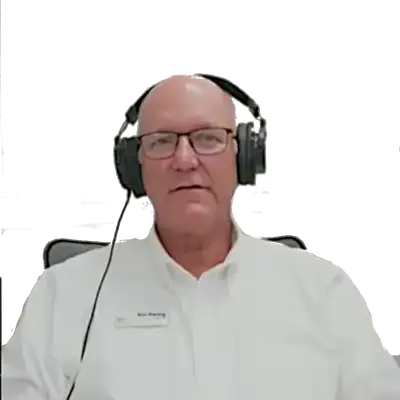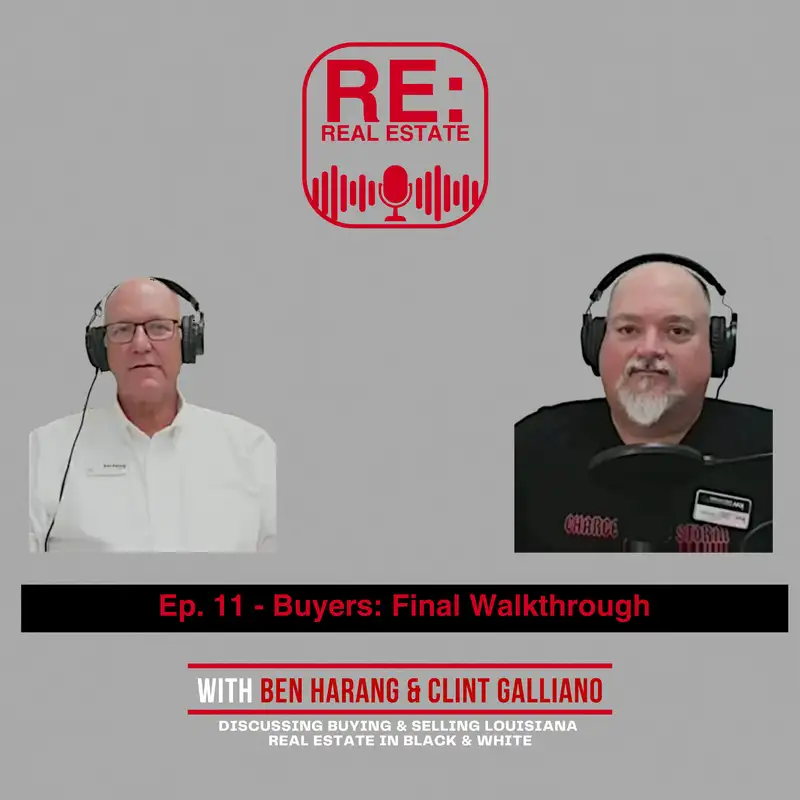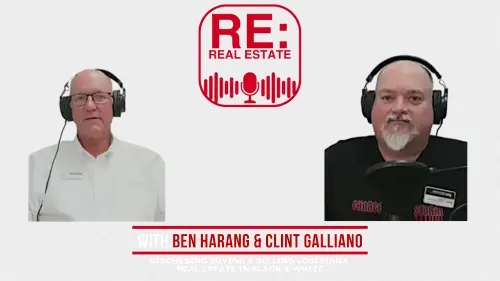Buyers: Final Walkthrough
Clint C. Galliano (00:25)
How you doing, Ben?
Ben Harang, Realtor (00:27)
Clint, I'm doing terrific, man. How you doing this afternoon?
Clint C. Galliano (00:30)
I'm doing wonderful.
Ben Harang, Realtor (00:32)
Good, good. The weather's nice, it's a little cool. It's a little overcast outside, but hadn't started raining yet. It's kind of nice.
Clint C. Galliano (00:42)
weather I can live with 365 days a year.
Ben Harang, Realtor (00:47)
I tell people this weather is nice. We ought to have this for six months a year, twice a year. So what are we talking about today?
Clint C. Galliano (00:52)
Right?
Today we're going to talk about the final walkthrough for buyers when they're buying a home.
Ben Harang, Realtor (01:02)
All right, that's always fun and interesting.
We have a clear to close probably by the time the final walkthrough comes through. We come to the final walkthrough and everybody's excited about buying the house and getting moved in and moving on with your life. But it's important to go in with your eyes open. There may be some things that the seller agreed to do to the house.
as a condition of the purchase agreement. So the expectation is that they've done it and it should be communicated when it's done. So the final walkthrough is just to go back into the house and confirm that it's the same house that it was when the purchase agreement was written.
You know, you hear horror stories about somebody has an area rug and when they move the area rug out from under the bed, there's a hole in the floor or the floor is worn out or the tiles are missing or something. You know, so those kinds of surprises are never fun, but hopefully nothing like that happens. But if they agreed to fix an oven, you just need to make sure you turn it on and make sure it's working because...
When you do go to the closing, you're going to buy the house as is. So if there's a problem, you really don't want to find out that there's a problem after you close. You want to address it before you close. So that's just some thoughts on, initial thoughts on the inspections.
Clint C. Galliano (02:47)
And then to add to the horror stories, there's also what's considered a fixture and what's not. you know, I've seen scenarios where sellers have removed items from the property that the buyers expected to come with the property and they should come with the property because they were attached and considered a fixture.
In some cases, the sellers returned them. In other cases, there was no help on the listing side or from this one instance from that agent's broker to help their buyers get the appliance back.
you know, it's spelled out in the purchase agreement that it's a fixture and name by name that it needs to stay with the home.
Ben Harang, Realtor (03:43)
Right.
And I had one of washing dryer ended up in Florida before we did the final walkthrough and it was supposed to those are problems that are never fun, but you just deal with them when they show up. And the timing of the walkthrough, the purchase agreement and...
just to point out that we're in Louisiana and we use Louisiana's purchase and sale agreement mandated by the Louisiana Real Estate Commission.
It says the final walkthrough will be done within five days prior to the closing. Sometimes they're done an hour before the closing. Sometimes they're done five days before the closing. It makes me little nervous when it's done an hour before the closing. I'd rather do it more than that. Give yourself as much time. So if you do discover a problem, there's time to solve it. But a lot of times people are just moving out.
and you really want to see it after they move out. When you go in, just do yourself a favor and turn the stove on, turn the oven on. Make sure hot water is still coming out of the tap.
just some things, because you don't want to move in on Friday afternoon. And about five o'clock, you realize the water's not hot or the water's off or something. And you can't get anything done over the weekend because the water got turned off or the water heater's not working or something. So it's just a confirmation. It's not to go re-inspect the house. It's just a confirmation that things are functioning as you expect them to function.
Clint C. Galliano (05:32)
And specifically, A, to make sure that everything is in the same condition as when the contract was accepted by all parties or the purchase agreement was accepted by all parties. But B, and like you mentioned earlier, if something was agreed to in the purchase agreement,
to be done or included or changed or what have you to make sure that that was done or during the due diligence and inspection period that repairs were requested and the sellers agreed to it then to make sure that the repairs were completed properly.
and not of a DIY nature bubble gum and duct tape.
Ben Harang, Realtor (06:29)
Yeah, yeah, and it's a good idea to bring the paperwork with you so you know exactly what you agreed to, what the seller agreed to, because you might have asked for a few things and during the negotiations you agreed to a few things not to be done and then you go in wondering why those few things that you initially asked for are not done.
So it's a good idea to have the final documentation on what everybody agreed to 30 days ago, however long it's been, just to make sure it's done. So once you buy the house, you buy it, you buy it as is, you take the keys, hopefully the utilities are transferred to you and you can start moving in, cleaning up, doing whatever it is you want to do, because it's now your house.
Clint C. Galliano (07:23)
Yeah.
agents should bring the purchase agreement, any things that were agreed to for repairs, documentation for that to make sure, copy of the inspection report, just to double check on things and verify with what was inspected and what was agreed to be repaired.
and in general just to make sure that everything was in the same general condition that it was when you first agreed to purchase the house. So that might be flashlights and what have you.
Ben Harang, Realtor (08:09)
Yeah, you know lot of things that come up in inspections of things like a cover on a junction box in the attic and You know if they it's a seller agreed to to do that then Be prepared to go up in the attic with a flashlight
and make sure the junction box covers are on. You know, just to make sure that everybody did what they said they were going to do. And there's an expectation that they have. But if you do it four or five days before closing, if there's a hiccup, you have time to fix it. If you do it an hour before the closing, there's really no time to do anything. Then you're sitting at the closing table trying to make a deal for an extension or
give them a week after close to fix it or whatever it is and that's just never a good idea. So I much rather find it four or five days before than an hour before to give everybody time to take a breath and deal with it.
Clint C. Galliano (09:10)
And that's the ideal situation. And in some cases, it's not possible to do that. options for mitigating an issue where you find something that wasn't done or something that was working and it isn't working or was OK before and is broken now.
some options that you can look at or have the seller immediately pay it or have some of the proceeds from the sale be withheld in escrow until the repairs are made and confirmed at the seller's expense. And then once that's all taken care of, then the remainder of the proceeds can be released back to the seller.
Those are some options for mitigating those types of issues to allow the closing to happen at that time, let the buyers start moving in, you know, unless it's something catastrophic, obviously, but that way it doesn't throw the closing off of the rails, but it still makes sure that everything gets done.
Ben Harang, Realtor (10:22)
Yeah.
Right, because if you get that close to the closing, there's a lot of pressure on both sides to close. The buyers need a place to live. The interest rate lock may be expiring. The sellers are moving on with their life. They're probably taking the money and buying another house. So it typically gets addressed, but I just hate for people to be in a position to have to agree to something just out of convenience and not something that they really wanted.
to do. And a lot of people, and I've done it myself, with their closings at 11 o'clock, we set 10 o'clock to go meet at the house to walk through it real quick just to look at it. And if we can avoid that, we try to. are circumstances beyond our control that sometimes we can't. But
Give yourself as much time as you can up to that five days just to make sure there's nothing wrong and then if there is something you have time to address it.
Clint C. Galliano (11:42)
So just to play devil's advocate, that there is a case to be made for doing it at the last minute. That being where if the sellers are still moving out the day before closing, you may want to wait until right before the closing to check it because I haven't personally run across it, but I've heard.
Ben Harang, Realtor (11:58)
Mm-hmm.
Clint C. Galliano (12:08)
stories from other agents that we work with of where they went to do a final or they did their final walk through. Sellers were still moving out and after the closing they went to the home and the floors were all gouged up from dragging furniture across it, door jams or damage from banging stuff into it, things like that. You know, so it's kind of a
I guess an audible at that point.
Ben Harang, Realtor (12:40)
Well, it's a judgment call and it depends on people's availability. But one way to address that is do a walkthrough four or five days before and see if there's anything that jumps out that needs to be done. And if everything looks good, then you schedule that 10 o'clock appointment prior to the 11 o'clock closing and take one final look at it after everybody's out. that kind of you brought up another good point.
the post-closing occupancy where the seller would stay in the house for a week or two after. That creates all kinds of issues with the condition of the house, as well as pre-closing occupancy by the buyer. I'm not a fan of either one of them.
just because if the air condition breaks or the water heater goes out or the dishwasher stops working, whose responsibility is it? There's a liability issue. It's just not a good idea. And we don't have it so much in Louisiana, but there's horror stories around the country of people selling property.
and the owner gets 30 days to live in the house after when things were hot and buyers had to agree to unreasonable demands. And at the end of 30 days, they just told them they were not getting out. And they became squatters and they had to go through the legal eviction process. And in the meantime, they're paying a note on the house they can't live in. So.
Pre-occupancy and post-occupancy are really not a good idea without very extenuating circumstances. I'm not saying it's never to be done, but there needs to be a real good reason and some clear guidelines and boundaries as to what happens if people don't get out. the post-occupancy agreements I've seen that I've used,
does explicitly say that there's not a landlord tenant relationship. It's part of the transaction.
You agreed to it to buy the house. You never agreed to rent them the house. It was built into the price of the house. You allowed them to stay for a week or two or a month so you could buy the house. So if they don't get out, it's not a landlord tenant issue that starts a timeline that's just not reasonable to have them evicted. It's like somebody broke into the house and won't get out. The cops can come in and get them out. So.
It's still a civil issue and it's just not a good idea to do it. So that's just my two cents on that thought.
Clint C. Galliano (15:36)
Yeah.
and touching on liability of it, the proper way to do it would be to have whoever's staying in the house purchase a renters insurance. And I don't know if it's even possible to get a renters insurance policy in that type of situation, but that would be the proper way to do it because the buyers
or sellers, depending on whether it's pre or post-closed occupancy, their homeowners insurance won't cover whoever's staying in the home. So if it's pre-closing occupancy, the seller's insurance isn't going to cover anything that happens with the buyer staying there. And then the same thing on the buyer's side if the seller's are still staying there after the closing.
Ben Harang, Realtor (16:39)
Yeah, and then what happens if the buyer moves in early and buyer overflows a second story bathtub or some child plugs a toilet on the second floor and it damages the downstairs of the house.
Clint C. Galliano (16:58)
Or they forget a pan of grease on the stove and it catches fire.
Ben Harang, Realtor (17:01)
that has happened. It becomes everybody's problem is the issue. And I just been around long enough to know that things do happen and that there's too many things that can happen with a pre or post closing occupancy, that it's not a good idea without very extenuating circumstances.
Clint C. Galliano (17:37)
So I think we've covered this fairly well. I'll say if anybody has any questions about this, feel free to post in the comments or send us an email. Email address is rerealestatepodcast at gmail.com.
Ben Harang, Realtor (18:00)
We'd love to hear from you. We'd love to hear from people. We're sitting here talking to each other, sharing our experiences. But if somebody has a specific question or a topic that you want to hear about, we'd love to hear about it and we can answer it on the next podcast.
Clint C. Galliano (18:01)
Anything else you want to add Ben?
Yeah, I'm going to set up a question form on the website. And maybe on the next episode, by the time we do the next episode, I'll have it set up and I'll say where it's at. That way, if you have questions, you can go and submit your questions there.
Ben Harang, Realtor (18:44)
There you go. Because, know, Clint and I are talking about basically the buying and selling process of real estate. And we've taken it from the initial buyer consultation to up to the final walkthrough. And that's what we're talking about today. And the next one will.
I don't know, might talk about a closing, might talk about something else, but if we miss something that you think about that you want to hear about, we'd be happy to talk about it.
Clint C. Galliano (19:20)
Definitely. We like talking real estate.
Ben Harang, Realtor (19:23)
That's pretty obvious, I think. All right, Clint, I think we're about done.
Clint C. Galliano (19:31)
All right, sounds good. We'll do it again soon.
Ben Harang, Realtor (19:38)
Maybe next week. Hope y'all have a great day.
Clint C. Galliano (19:40)
Maybe next week.
You have a wonderful day.
Ben Harang, Realtor (19:45)
Have a terrific day.
Creators and Guests



